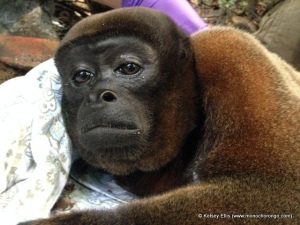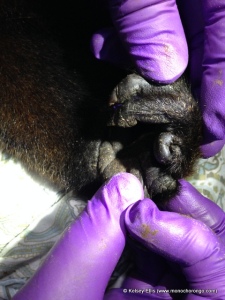Written by Laura Abondano
YASUNI BIOSPHERE RESERVE, Ecuador – Guava, a baby woolly monkey, jumps off her mother’s back and lands on the back of Gordon, a male from one of the groups of woolly monkeys living at the Tiputini Biodiversity Station deep in the Amazon rainforest. Gordon continues moving a few meters in the tree with Guava on top of him before he sits down to rest with the baby still on his back. Guava’s mom, Guayaba, approaches Gordon and while the adults sit down to rest from a long journey, the baby plays with Gordon’s tail over and over again.
Lowland woolly monkeys live in groups where females typically display sexual behaviors that invite males to copulate with them. In fact, it is not unusual to see a female mating with multiple males in the same day, making it difficult for males to be certain of who they are fathering. Interestingly, males are often seen carrying, playing, grooming, or socializing with young infants, just like Gordon with Guayaba’s daughter, Guava. But not only are males tolerant with young infants, they also seem to be interested in maintaining close proximity to females with infants. What is very intriguing is why males engage in these friendly behaviors with infants given that they are not guaranteed to be the father.
As part of my doctoral research, I am studying how adult male woolly monkeys interact with infants to understand why it may be advantageous for males to have these strong social bonds with the infants or their mothers. Among primates, baboon and macaque males are known to form ‘friendships’ with mothers in their social groups. Mothers may be interested in creating these friendships given that these so-called male ‘friends’ may be offer protection or share food with the female and her offspring. But what do males gain from investing time with these females? Shouldn’t they be looking for other females to mate with?
If a male suspects that they may be the father of the infant, a strong relationship with the infant or his mother may increase the chances of survival of their own offspring. However, woolly monkey males have low certainty of who they are fathers to given that females may have copulated with other males during the previous mating season. It is possible that males may be interested in forming strong social bonds with females who have infants that are not necessarily their own, in order to increase the chances of the male mating with that female afterwards. This behavior is often seen among males that use their friendships to compensate for their low ranking position in the dominance hierarchy or reduced attractiveness as mates.
Among woolly monkeys, however, it is still unclear whether male relationships with infants and their mothers represent care for their own offspring or whether it reflects a male strategy to strengthen social bonds with females in order to increase future mating opportunities. Establishing paternity relationships between males and infants is the next step for our woolly monkey research team at UT-Austin, which will clarify whether males are really caring for their offspring, or whether they doing so to ensure their future reproductive potential.
In this video a small male infant, Dax, transfers from his mom, Darlene, on to a small adult male, Dash, and crawls around for a few seconds before transferring back to mom.



